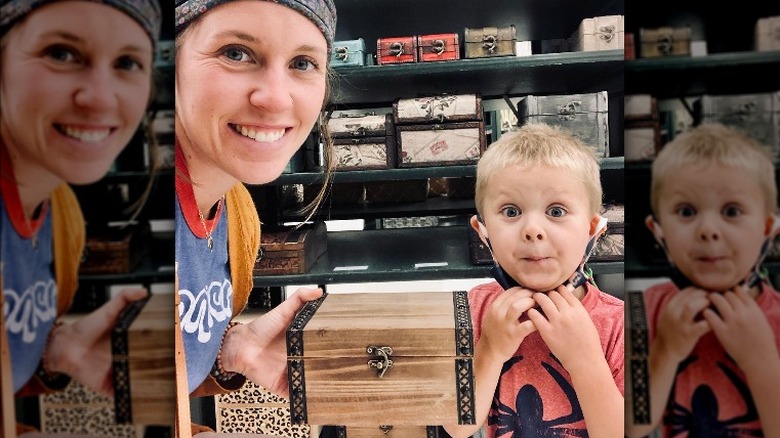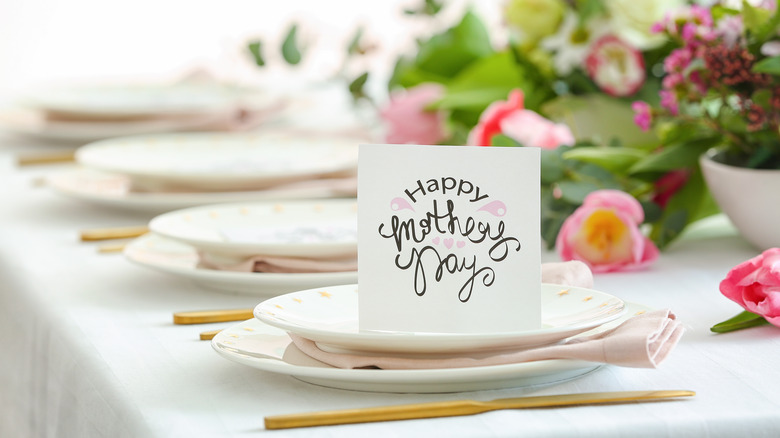How To Cope When Mother's Day Is Difficult For You
We may receive a commission on purchases made from links.
The month of May brings lilacs on the bushes, sunscreen on CVS shelves, sandals on our feet, pollen in our sinuses, and constant reminders that a certain holiday is coming soon. Ads and articles everywhere (yes, even on The List) recommend the best Mother's Day gifts for moms, aunts, and grandmothers. Brunch reservations quickly fill up for the second Sunday in May, and florists get busy making bouquets and corsages. With all the hype, it can be easy to forget that Mother's Day can be bittersweet or downright painful. Children who have lost mothers, parents who have lost children, and people who have difficult relationships with their moms may come to dread this time of year.
Ironically, even the originator of Mother's Day came to hate the holiday. According to History, a West Virginia woman named Anna Jarvis came up with the idea of celebrating mothers in 1908, and her efforts led to the establishment of Mother's Day six years later. As the holiday became more of an excuse to sell flowers and candy, Jarvis rebelled and tried to ban her creation unsuccessfully. She surely would have empathized with everyone who can't cope with the ads of happy moms opening presents and eating omelets.
If you're not looking forward to Mother's Day this year, here are some ways to help make the day more manageable. (Remember, this applies to Father's Day, Thanksgiving, and other holidays.)
Take a social media break
Like most holidays, Mother's Day is an occasion for folks to flood their TikTok and Instagram accounts with images of lavish brunches, suggestions for thoughtful gifts, and happy mom moments. If you know it'll be tough to scroll through your feed and post likes to everything, just don't. Avoid those apps and sites for a day or even two (lots of moms post their messages of gratitude the Monday after). Turn off your phone and tablet if you have to; you'll save yourself a lot of stress. Besides, when you give up social media, your body responds by becoming more focused and relaxed. You might even get a better night's sleep: Screens emit a blue light that interrupts the sleep signals in the brain.
On the other hand, if you're looking for support, you may find it helpful to create a post telling your friends what you need: "Mother's Day is a difficult time for me because ___________. I could use your good thoughts."
Use your opt-out function
If you're on the email list for every company under the sun (and who isn't?), you may have noticed that some are asking if you want to receive Mother's Day messages. Per NPR, this trend really took off around 2021, when the COVID-19 pandemic was still taking a devastating toll. Realizing that customers who lost loved ones might find a holiday reminder painful, companies such as Etsy, Colugo, and Jeni's Ice Cream offered an opt-out for Mother's Day and Father's Day communications. Take advantage of the opportunity to avoid being flooded with "shop for Mom now!" messages. Unfortunately, no single site allows you to opt out en masse, so you'll have to go through your inbox and click the sites one by one. Doing a mail search for "Mother's Day" or "opt-out" should bring up the right ones.
On the other hand, you may not be a fan of the opt-out. Some people feel that any mention of the holiday — even an offer to stop messaging — is too much of a reminder. In that case, your best bet is to extend your social media blackout to include checking your email. Come Monday, the new messages will have pushed the Mother's Day ads to the bottom of the pile.
Find a way to honor your memories
No matter how many years ago it happened, losing a mother or child is bound to bring up poignant memories when Mother's Day comes around. As heart-wrenching as that can be, taking time to remember our loved ones is important. Psychology Today quotes studies showing that memories give us a sense of connectedness with the person and comfort us and make us feel better in the long run.
If you're up to it, finding a personal way to honor your loss can be a meaningful way to spend Mother's Day. Playing music or making food that reminds you of your mother, mother figure, or child are good options. Another idea: creating a tangible memorial, as Jill Duggar Dillard did. The former "19 Kids & Counting" star suffered a miscarriage in the fall of 2021; it would have been her third child. Although she went on to have another healthy baby soon after, Jill remembers the heartbreaking anniversary every year. She also created a memory box, seen here. "We will keep pregnancy tests, hospital band, letters, and anything else we want to remember the baby by in here," she wrote on Instagram. Other options include a photo collage, a personalized garden stone, or a tree planted in your loved one's name.
Be kind to yourself
Any mother-related loss is a horrible experience, whether an actual death, an unsuccessful fertility journey, or the grief over the mother-child relationship you wish you'd had. Whatever your situation, it's important to recognize and honor your emotions rather than trying to deny or minimize them ("Other people have gone through much worse"). Don't fall into the trap of thinking you "should" feel a certain way, either. Grief and stress are highly individual matters.
Plan ahead for what might help you cope with Mother's Day, and emphasize self-care. Sleep late, order a DoorDash from your favorite Thai restaurant, visit a museum, or whatever makes you feel nurtured. Some people find it cathartic to write or express their feelings through art. If there's something you need from family or friends to help you cope, let them know, and be specific: "Can you watch the kids for an hour so I can go for a walk?" or "Do you have time to meet up for breakfast?"
It's okay to celebrate Mother's Day, too
It's easy enough to cocoon on Mother's Day if you have no other obligations. But what if you're still expected to celebrate it — say, your husband and kids want to take you out for brunch, or you're invited to have a drink with all the in-laws? It all depends on what you can manage. Party planner The Favor Stylist explains that "it's okay to say no" to a party or special event if you're really not up to it. If you do choose to honor the holiday, except that it may bring up some sadness and poignant memories. Attending a Mother's Day event could also help you find surprising moments of joy. This is not only normal; it's also a part of life. You may eventually think of the holiday in a "new normal" kind of way: not perfect, but still a reason to be grateful for your blessings.
Reach out to a hurting friend
Maybe it's not you, but a friend who dreads Mother's Day every year. If that's the case, consider letting her know you're there for her. It could be as simple as reaching out and saying, "How are you doing? What can I do to help?"
As big as their Mother's Day business is, Hallmark still recognizes that the holiday isn't happy for everyone. They offer suggestions for supporting somebody who needs extra love on this day. Find out what they need: Do they want to share memories or just want to forget the holiday even exists? Then take your cue from that and think of something thoughtful to do. Take your friend for a stroll in the park. Treat them to a movie or coffee (pick a place that isn't likely crowded with families). Write a comforting note, donate to a charity in their name, or send a meal. They'll be grateful to know someone understands and acknowledges their feelings.






